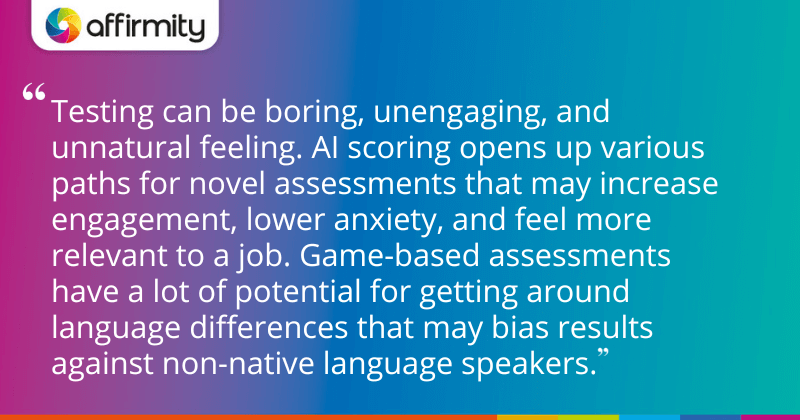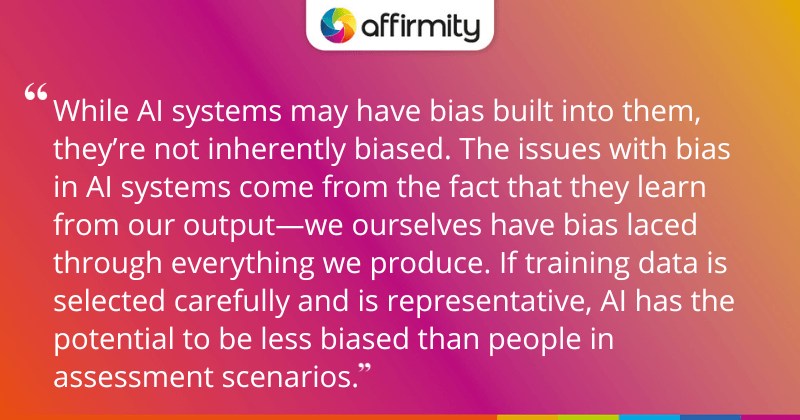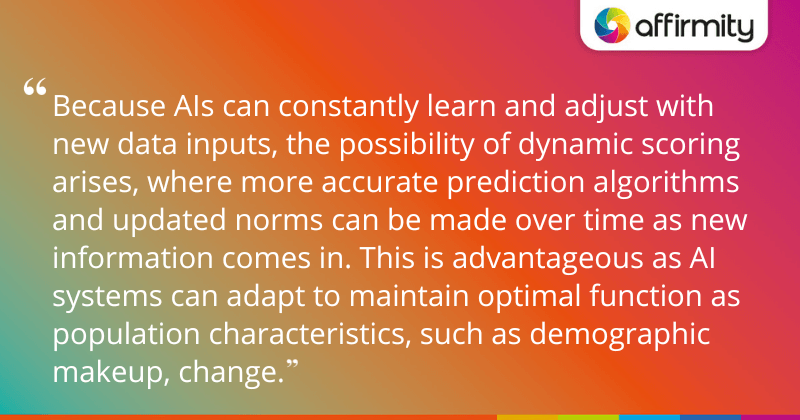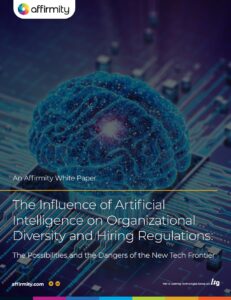The current wave of AI technologies promises a level of utility that has seen businesses of every type scrambling to incorporate it into their offerings, technologies, processes, and information systems. In this article, Affirmity Principal Business Consultant, Patrick McNiel, PhD, considers the opportunities that AI presents in the candidate selection and assessment space.
The six sections to follow will describe the utopian version of artificial intelligence in relation to recruitment. This is an analysis of what AI could be, and its potential to create positive outcomes in this context. However, what will be described here isn’t necessarily the current state of things. So, keep in mind that getting to this utopian version of AI’s potential with respect to hiring processes will require social movements, regulations, and societal norms to move in the right direction.
1) AI Promises Convenience, Lower Costs, and Efficiencies in Hiring Decisions
What is likely to happen in the job market, based on the direction technologies and business interests are going, is a shift in how organizations and people find each other. Right now, people go to businesses and begin a vetting process that’s controlled by the business. This isn’t optimal for either party. Job seekers must contend with a new and different process for each business, essentially doing the same thing over and over again for each job they’re interested in. And, each business must maintain an expensive and time-consuming apparatus that is devoted to finding and vetting potential employees.
AI agents are a potential solution to this issue. Aided by trusted external assessment companies, social media companies, and information depots, online profiles can become more complete and contain verifiable information about a person’s knowledge, skills, abilities, personal characteristics, and work experiences. AI agents can then assemble this information, place it in a standard format, and seek appropriate opportunities for individuals. Job seekers will just need to tend to their online profiles in general and tell their AI agents which opportunities are of interest.

Businesses will thus have pre-vetted job seekers brought to their AI agents who can verify matches to job requirements and begin a process of serious consideration for the most qualified candidates. This new process could also yield great benefits for individuals with disabilities, who would no longer need to engage with multiple, non-standard, non-ADA-compliant interfaces, or to engage separately with every company to request accommodations at earlier stages of the hiring process.
DATA QUALITY ASSISTANCE FROM THE BLOG | ‘4 Signs That Your Applicant Data Won’t Pass an OFCCP Audit’
2) AI Has the Potential to Engage Candidates More Effectively
Testing can be boring, unengaging, and unnatural feeling. AI scoring opens up various paths for novel assessments that may increase engagement, lower anxiety, and feel more relevant to a job. Additionally, game-based assessments, that measure something like the “big five personality traits” have a lot of potential for getting around language differences that may bias results against non-native language speakers.

3) AI Could Play a Significant Role in Reducing Adverse Impact and Bias
While AI systems may have bias built into them, they’re not inherently biased. The issues with bias in AI systems come from the fact that they learn from our output. And, as scientific literature makes very clear, we ourselves have bias laced through everything we produce. If training data is selected carefully and is representative, AI has the potential to be less biased than people in assessment scenarios. Additionally, AI systems can be adapted to reduce or eliminate bias, if the sources of that bias can be identified. In contrast, people are fairly resistant to attempts to reduce their intrinsic biases.
DE&I INSIGHTS FROM THE BLOG | ‘5 Self-Critical Questions That Help Organizations Support the Career Mobility of Marginalized Groups’
4) AI Can Improve Candidate Assessment Reliability
AI systems don’t get tired, moody, hungry, impatient, or disinterested, and they will apply the same criteria or interact with people in the same way every time. This greatly increases the potential for these systems to be more reliable. This is true in the more general behavioral sense (i.e. regarding what they do), but also in the psychometric sense (i.e. regarding how consistent scores, recommendations, or categorizations they make will be).
Psychometric reliability is a fundamental property of good assessments, and high reliability is needed for an assessment to be valid. This is important for a number of reasons, but the most pressing is that evidence of validity is required when a test shows adverse impact against protected groups defined by Title VII of the Civil Rights Act.

5) AI Could Make Candidate Assessment Scoring More Dynamic
Because AIs can constantly learn and adjust with new data inputs, the possibility of dynamic scoring arises, where more accurate prediction algorithms and updated norms can be made over time as new information comes in. This is advantageous as AI systems can adapt to maintain optimal function as population characteristics, such as demographic makeup, change. Unfortunately, it must be added here that dynamic scoring has several serious issues that need to be addressed before it’s implemented. (For a discussion of the most salient of these issues, please see our full white paper).
What Are “Norms” in the Context of Artificial Intelligence?
Norms allow test takers to be compared to one another based on their test scores. They typically result in a percentage expression such as ‘Max scores higher than 96% of all other test takers’.
6) AI May Find Unexpected and Non-Intuitive Solutions to the Problems of New Hire Assessment
Machine learning systems can start from scratch and come up with some very unexpected and interesting relationships if assumptions are not programmed in from the start. This can lead to non-intuitive paths to desired outcomes, such as high test validity and low adverse impact. Assuming the paths AI takes are interpretable, our understanding of what causes protected class differences, what assessment characteristics are more or less likely to cause class differences, and how to combine information to create greater fairness will all increase as these systems are utilized.
HAND-PICKED FOR YOU | ‘How Affirmity’s TotalView Methodology Can Help You Maximize Management Visibility of AAPs’
Continue Reading and Learn About the Potential Negatives of AI
Now that you’ve heard about how AI may be able to positively contribute to your compliance and DE&I efforts, it’s time to learn all about the potential negative effects of AI. This article is a chapter from our white paper, “The Influence of Artificial Intelligence on Organizational Diversity and Hiring Regulations: The Possibilities and Dangers of the New Tech Frontier”. Inside, we explore the “dystopian now” of AI use for the selection and assessment of new hires. We’ll additionally consider how AI and machine learning technologies are currently used for this purpose, and look at key emerging regulatory trends.

Download the full White Paper today.
Root out bias and adverse impact at key decision points in your talent acquisition processes. Contact Affirmity today to learn more about our talent acquisition process reviews.
About the Author

Patrick McNiel, PhD, is a principal business consultant for Affirmity. Dr. McNiel advises clients on issues related to workforce measurement and statistical analysis, diversity and inclusion, OFCCP and EEOC compliance, and pay equity. Dr. McNiel has over ten years of experience as a generalist in the field of Industrial and Organizational Psychology and has focused on employee selection and assessment for most of his career. He received his PhD in I-O Psychology from the Georgia Institute of Technology. Connect with him on LinkedIn.
